This 23-YO’s Coconut-Harvesting Robot Is Transforming Farming in Kerala
In a quiet neighbourhood in Kozhikode, Kerala, a young boy turned his balcony into a makeshift theatre. At that time (2013), Ashin P Krishna was in Class 6, but this innovation planted a seed that would one day grow into something far more remarkable.
Now 23, Ashin is the founder of Altersage Innovations and the creator of Coco-bot, a semi-automatic coconut-harvesting robot that makes the dangerous and difficult job of climbing tall trees to pick coconuts safer and easier. His journey from curious schoolboy to tech entrepreneur is a story of grit, regret, reinvention, and a drive to make a tangible social impact.
Creating for purpose and impact
Ashin’s love for building things began early, inspired by the animated creations he watched on TV channels like POGO and Max TV. “Till Class 8, creating and building projects that were already in existence was my hobby,” he recalls.
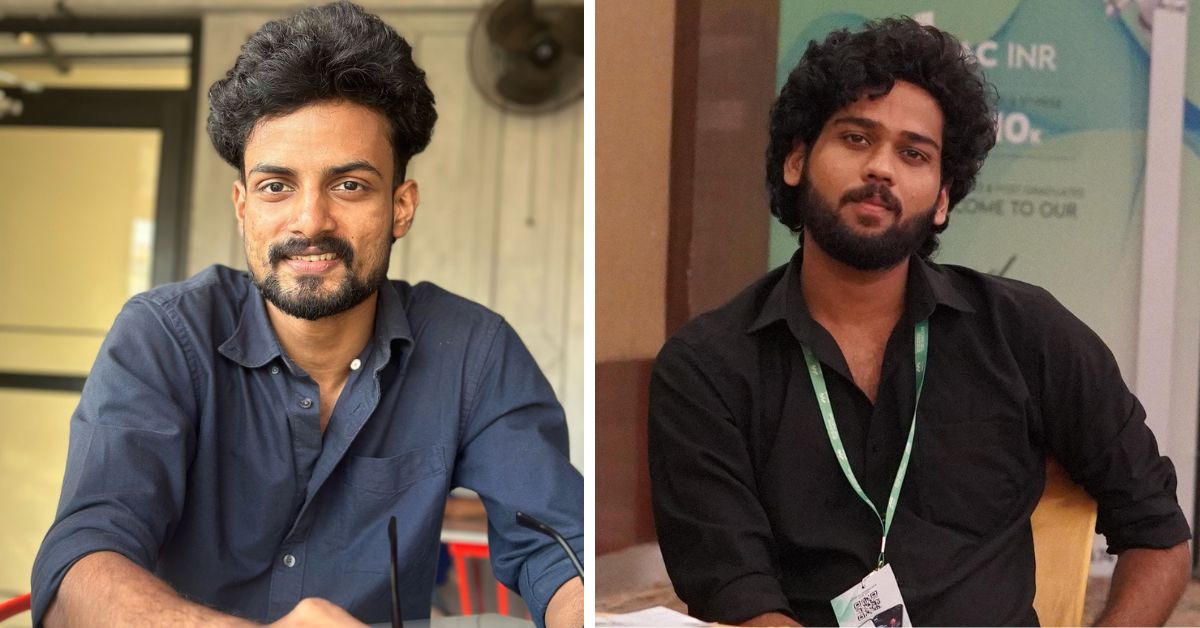 Ashin has been an innovator since his school days.
Ashin has been an innovator since his school days.
His enthusiasm for replicating what he saw eventually led to a turning point — a casual conversation with his parents that would shift his perspective entirely. “They said, ‘Why can’t you innovate something new instead of copying?’ That struck me deeply,” he says. From that moment, Ashin decided to move away from imitating and instead focused on creating something truly original.
The first fruit of this new mindset came in Class 9, when Ashin built a mini smart portable Android projector — without referring to any tutorials or guides. “That project made me believe I could actually innovate,” he says. The young innovator decided then that everything he created henceforth must be unique, purposeful and have social impact.
‘The biggest regret of my life’
By the time Ashin completed school in 2019, he had already built a smart portable air conditioner which used minimal energy. The invention earned him a spot at the prestigious 46th Jawaharlal Nehru National Science, Mathematics and Environment Exhibition (JNNSMEE) by NCERT and won third place at the state level. Naturally, expectations soared, and he was urged to participate in the Indian Science Congress (a national event where young innovators present their best projects), India’s most prestigious science platform.
But fate had other plans. That year’s theme was agriculture, and Ashin’s air conditioner project wasn’t selected.
“I was just 17. I missed the invitation from Rashtrapati Bhavan, the opportunity to speak to Prime Minister Narendra Modi, and to be awarded. That regret stayed with me,” he admits. For someone who had put his heart into innovation, the disqualification stung deeply. But it also planted a new idea — one that would soon take root in the most unexpected way.
The bathroom realisation
In November 2019, while still grappling with the disappointment, Ashin applied for the Nanshan Entrepreneur Star Contest 2019 by the Shenzhen municipal government. He was selected as a semi-finalist and received a robot TS100 tank chassis (a compact, tracked robotic platform often used for building mobile robots) as a gift. Around the same time, his thoughts lingered on agriculture — the theme that had cost him a life-changing opportunity.
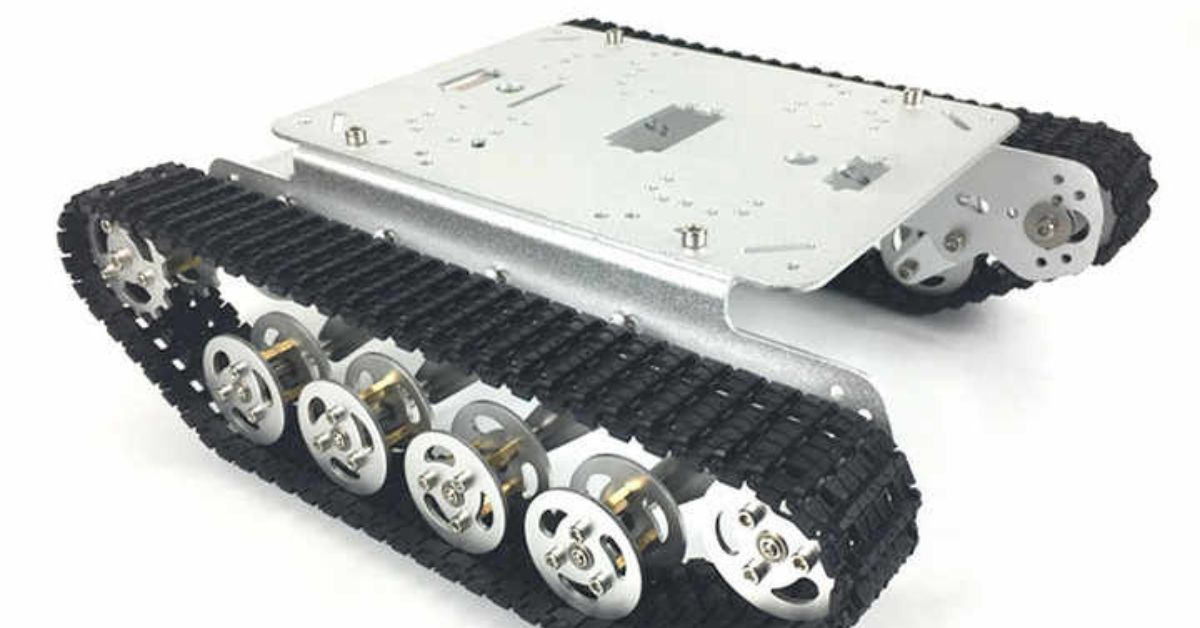 The robot TS100 tank chassis and the theme of agriculture led to the futuristic tree climbing robot.
The robot TS100 tank chassis and the theme of agriculture led to the futuristic tree climbing robot.
Then came the moment that changed everything.
“It was 2 January 2020. I was taking a bath and looking out of the window at the coconut trees around my home,” he says. Suddenly, a visual flashed in his mind: a futuristic robot climbing up a tree and harvesting coconuts. “At that moment, I decided this would be my next big project.”
Planting the seeds for Coco-bot
Ashin spent the next year immersed in deep research and development. He didn’t look up existing prototypes or models online. “I had a clear vision of how Coco-bot should be. I didn’t want to be influenced by what was already out there,” he says.
By 2021, he had built a low-quality prototype but got caught up with college work after enrolling for a diploma in mechanical engineering at JDT Engineering College. Still, the dream of building Coco-bot never faded.
In 2023, Ashin participated in the 36-hour-long Vaiga Agri Hackathon organised by the Department of Agriculture, Kerala. Coco-bot went on to win the competition — a turning point that brought his work into the spotlight. Soon after, NABARD (National Bank for Agriculture and Rural Development) reached out, expressing interest in supporting the project.
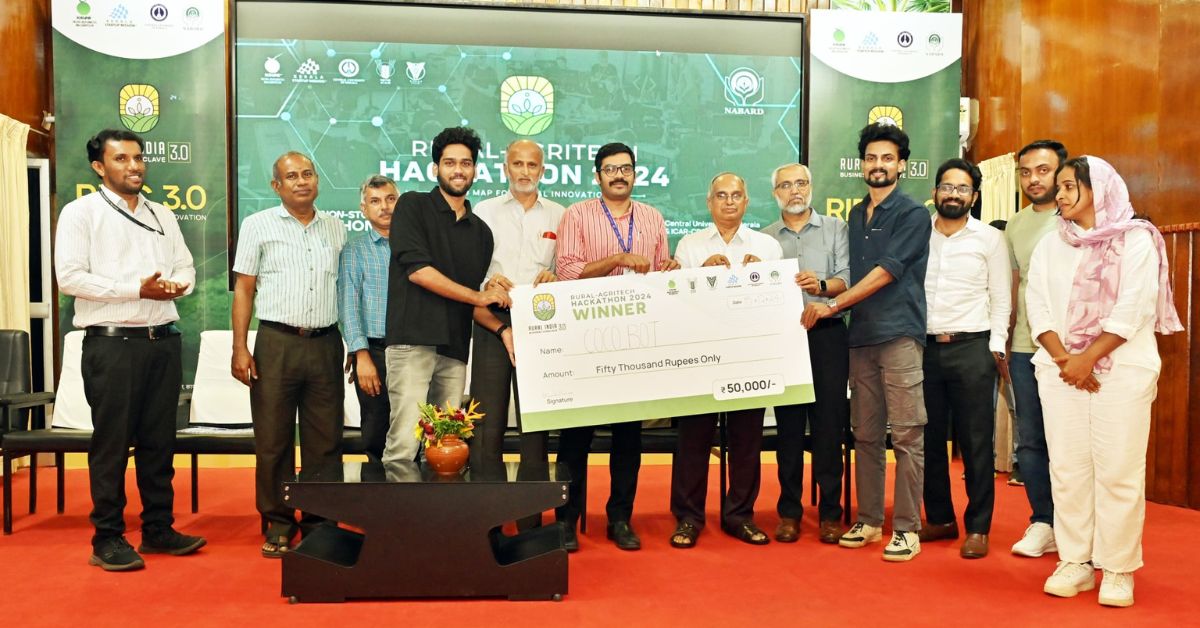 Winning the Hackathon helped Ashin to be involved full-fledged in creating Coco-bot.
Winning the Hackathon helped Ashin to be involved full-fledged in creating Coco-bot.
“We were excited when NABARD contacted us as it provided the hope to take this project to the next stage,” he says. “Only because of NABARD, Vadagara Coconut Producers Company, and Professor Shaseendran, we are here, otherwise, I would have opted for a different job,” adds Ashin.
This milestone reignited Ashin’s entrepreneurial spark. Having turned down a BTech seat and a job placement after graduating in 2023, he committed himself to Coco-bot full time. “I knew that if I didn’t start the work now, it would become another big regret.”
By February 2024, he had fully invested himself in building the product, and in August, he officially registered his startup, Altersage Innovations.
Building the dream team
Now, Ashin needed a team to bring his vision to life. So in 2023, he circulated posters calling for interns, eventually filtering down from 15 candidates to a tight-knit group. Today, his team of four works out of a small office in Kozhikode, focusing on refining the prototype into a minimum viable product.
Their invention, Coco-bot, is a compact, semi-automatic robot that weighs under 10 kgs and can be easily fixed onto any coconut tree. “The height is similar to a gaming laptop. One person can carry it and fix it onto the tree,” Ashin explains.
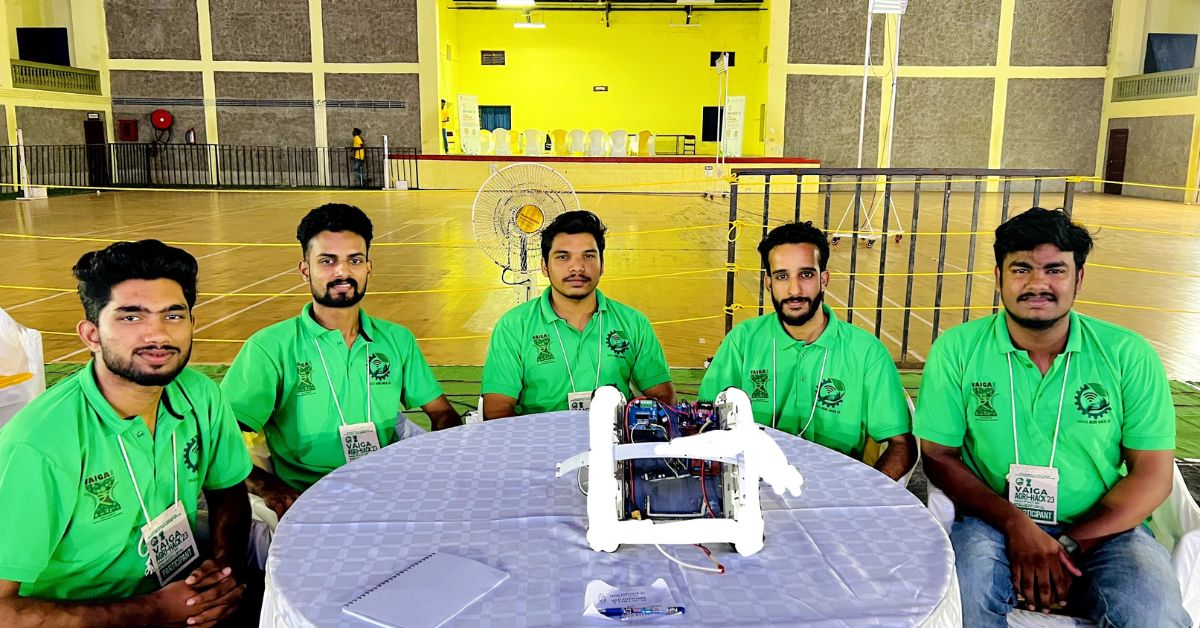 The team behind bringing Coco-bot to life.
The team behind bringing Coco-bot to life.
It climbs as fast as a human, and once at the top, its in-house developed wireless robotic arm harvests coconuts and leaves and even performs maintenance. It is controlled through a custom-built console.
“The console is not complicated to operate and can be easily learned within a span of two hours,” shares Gokul Krishan, the Chief Technical Officer (CTO) at Altersage Innovations, who has been involved in the company for over a year and a half.
“Among the elements, building the robotic arm took time, as it was challenging to replicate the hand movement of a human,” adds Gokul.
Changing the future of coconut farming
Coco-bot aims to revolutionise coconut farming by making it safer and more accessible. “Climbing a 20-metre tree is extremely risky and physically demanding,” says Ashin, who even attempted it himself at a workshop in Thrissur. “It’s not easy, and there are no safety measures in place.”
The startup’s vision includes deploying Coco-bot at the district and panchayat levels, empowering rural communities, particularly Kudumbashree women and ASHA workers, to earn a steady income, which is estimated at around Rs 18,000 to Rs 20,000 a month — through operating the bot.
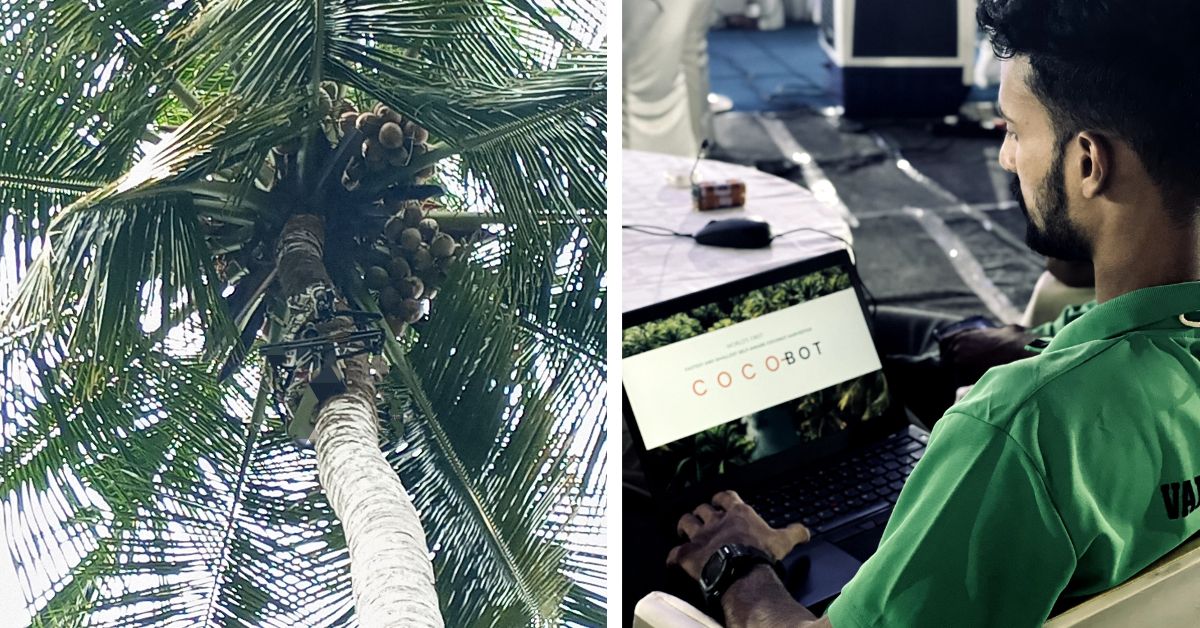 Coco-bot also provides equal opportunity for women in coconut farming.
Coco-bot also provides equal opportunity for women in coconut farming.
Highlighting its efficiency, Gokul says, “Since it’s a robot, we can also use it round the clock, at any time of the day, which is not possible for a human climber. It also saves energy for a human to do this.”
This efficiency becomes especially relevant in a profession that’s losing takers. “Kalpavriksha Foundation in Coimbatore told us that no one wants to take up coconut harvesting as a career anymore because of the high risk and skill required,” Ashin adds. Coco-bot hopes to change that narrative.
The road ahead
As the team moves into the second iteration of Coco-bot, the goal is to create a manufacturing-ready prototype by 2025. “We’re currently bootstrapped, but investor talks are underway. The cost of the final product should be under Rs 1 lakh,” says Ashin.
Altersage Innovations is supported by NABARD, Vadagara Coconut Producers Company, and collaborators like Maker Village and IIM Kozhikode. “If not for their belief and funding. I would have been doing a different job.”
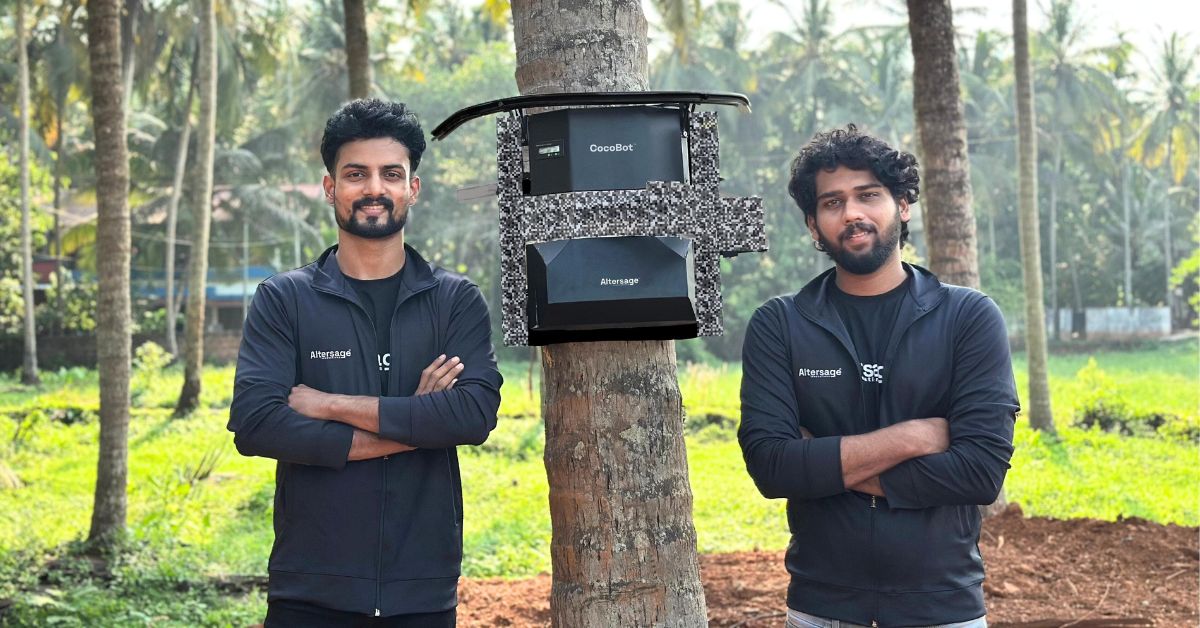 Currently working on the second iteration, Coco-bot is set to hit the market by the end of 2025.
Currently working on the second iteration, Coco-bot is set to hit the market by the end of 2025.
Coco-bot has also captured the attention of industry major Marico Ltd, which produces the popular Parachute brand coconut oil.
However, for Ashin, it’s more than just a job. Innovation is his calling— sparked on a balcony, sharpened by setbacks, and nurtured by a vision that continues to grow — just like the coconut trees that first inspired it.
Edited by Vidya Gowri Venkatesh; All images courtesy Ashin P Krishna
News